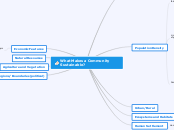What Makes a Community Sustainable?
Physical Features and Landscape (Landforms)
Population Density
Population Density is the number of people living per the unit of an area.
The formula for calculating population density is
number of people divided by area of land
Links with population distribution, which is the spread of people across the world ( or where people live )
Population Distribution contains three categories
Clustered Distribution
Clustered distribution refers to when an area
has very clustered density, and it's population are
very packed together.
Clustered distribution is commonly seen
in urban areas.
Subtopic
Linear Distribution
Linear distribution refers to when an area has
a density where it's population is in a linear order.
Linear refers to straight, which means
that the population on some maps is shown
in a straight line, which may vary in different directions
Subtopic
Scattered Distribution
Scattered distribution refers to when an area has
widely spread distributions of people.
Scattered distributions usually applies in rural areas
Subtopic
Contains three main categories of density
Low Density
Low density usually refers to when the density
of an area is below 50 people per square kilometer
Moderate Density
Moderate Density usually refers to when the density
of an area is between 50 to 150 people per square kilometer
High Density
High density refers to when there are more than
150 people per square kilometer in a certain area or community.
Urban/Rural
Ecosystems and Habitats
Human Settlement
Human settle yyyyyyyyyyyyyyyyyyy
Economic Features
Subtopic
